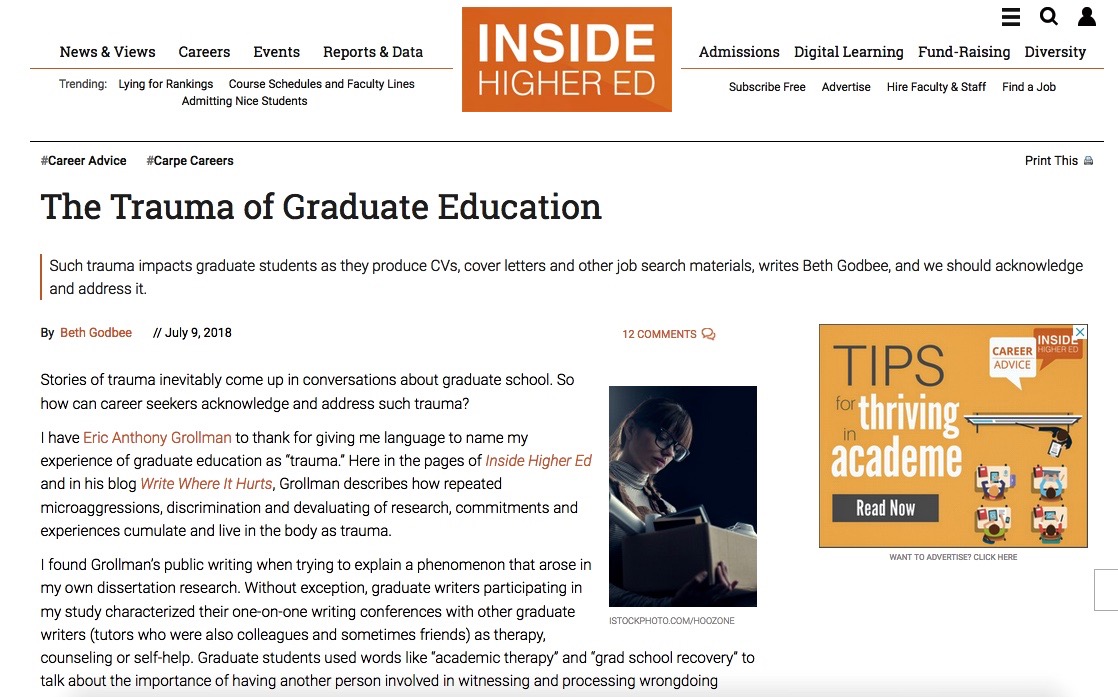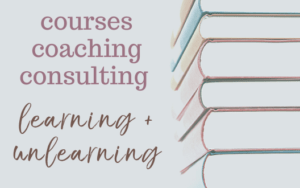As part of my research on epistemic injustice, I’ve been thinking about the power of naming: the power of having the linguistic resources to identify, describe, and call out varied experiences, especially experiences of injustice.
Systemic oppression works in a way that denies the ability to name experiences of wrongdoing. When experiences are named, they can be acknowledged and addressed. To me, this is part of the power of the word microaggressions: the word allows for acknowledgement of what too often goes unacknowledged. Similarly, phrases like sexual violence, rape culture, and #metoo do important work in raising awareness, mobilizing response, allowing for healing, and calling attention to what’s typically hidden.
This week Inside Higher Ed published my article on why it’s important to acknowledge and address the trauma of graduate education as part of career conversations:

“The Trauma of Graduate Education” shares insights from this research on epistemic injustice, relating how graduate writers (participants in my dissertation research from several years ago) described the need for therapy, counseling, and self-help. In interview after interview, I heard writers (many of whom were white women and women of color) describe harms inflicted through graduate school. Moreover, participants’ stories echoed my own experiences with graduate education, which tore down my confidence, contributed to internalized pain, and kicked off a healing process that’s now taking me away from higher education.
In the article, I describe why it’s important to name these experiences as trauma:
“Often conversations with career advisers are similar to those among graduate writers: it is common to share, receive and even exchange stories of trauma while often not naming it as such. An important part of career conversations, therefore, may be recognizing trauma as trauma. There is power in naming experiences: acknowledging and giving language to describe trauma can lead to other actions, such as seeking trauma-informed care or, in Grollman’s words, “rewriting the trauma narrative.” Similarly, it’s important to name microaggressions as microaggressions, epistemic injustice as epistemic injustice and violence as violence. Doing so validates the reality of the experience (essentially saying, yes, this experience really did happen and really is wrong), countering the many invalidations that cumulate into trauma. Further, giving language to experience helps with developing the linguistic resources to understand, process and describe trauma and other injustice.”
My call to name trauma must have struck a chord with readers. On the one hand, I’m experiencing a new round of graduate students (especially white women and folks of color) reaching out and saying, “Yes, me too!” On the other hand, I’m seeing comment after comment (from what I can tell, all by white men) complaining about my “over-sensitivity,” exaggeration, and misuse of the word trauma.
Alongside these various forms of gaslighting (another powerful word for naming injustice) is a familiar rhetorical move of saying that if the experience of graduate education is too traumatic, then folks should just leave. Here again, as in my dissertation research and my own lived experience, I see readers (folks engaged in academia) making the moves that feed into trauma: those of denial, dismissal, and disengagement.
Such interactional moves point to why we need an “unrestrained” definition of trauma. What registers as trauma to one person may not to another, but to deny the experience is to deny the person. Writing off the reality of trauma is linked literally to writing off the people who experience it. Hence, we see the perpetuation of violence—perpetuation of oppression, white supremacy, hetero-patriarchy, and epistemic injustice—within and beyond higher education.
Though this violence is all-too-familiar, I am encouraged again by the power of speaking and writing UP. I am encouraged that together we can build the linguistic resources to name experiences of injustice, and together we can use the act of naming to mobilize.
Today, tomorrow, and going forward, I’m naming trauma as trauma. And I hope you’ll join me in naming experiences of injustice to acknowledge and address them. We’ll need a lot of creativity and visioning to keep building the words for naming what’s intended not to be named. But build together, we must.
Update: You can now listen to article (and others on career discernment) read by the author. Click the video below, or navigate over to the YouTube channel for Heart-Head-Hands: Everyday Living for Justice. Thanks! ~ Beth
—
This post is written by Beth Godbee for Heart-Head-Hands.com. For more posts like this one, you might try “A Love Letter to Students Surviving Sexual Violence,” “A Barrage of Microaggressions,” and “Speaking Up by Speaking Aloud Embodied Responses.” Please also consider liking this blog on FB and following the blog via email. Thanks!



thank you!
Perfecto!!
Sent from my iPad
>
Right on!
Yes.